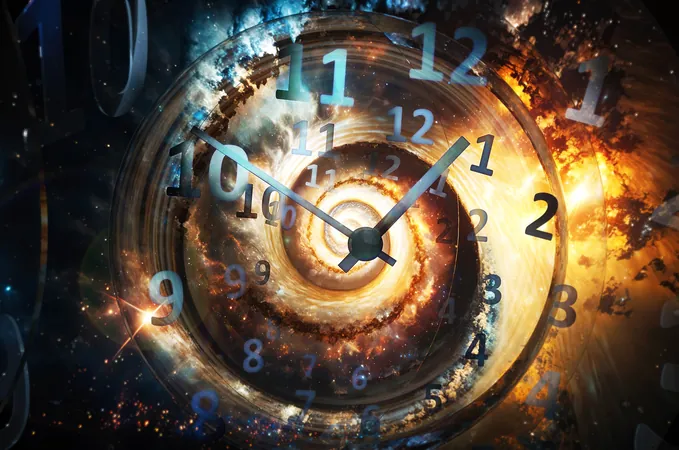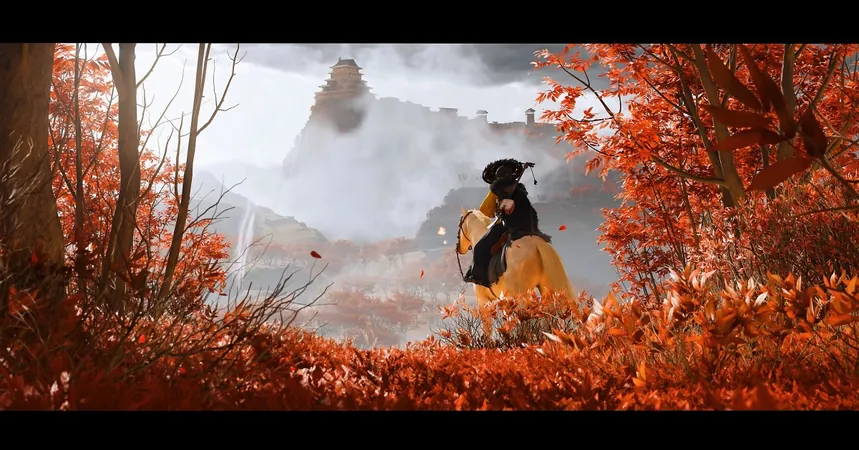
Is Time Just an Illusion? Groundbreaking Theories from Modern Physics Challenge Our Perception of Time
2025-01-12
Author: Ken Lee
The Perception of Time Under Scrutiny
The concept of time as a continuous, flowing journey is beginning to face serious theoretical challenges. Some researchers argue that time, as we experience it, could be merely a trick of our perception, devoid of any fundamental existence in the fabric of reality. Dr. Carlo Rovelli, a prominent theoretical physicist known for his work in loop quantum gravity, posits that traditional notions of time may be misguided. According to him, the equations governing the physical universe do not define what happens "now," revealing a significant distinction between our intuitive experience of time and its scientific implications.
The Clash Between Intuition and Physics
People typically perceive the present moment as distinct while viewing the future as fluid and the past as unchangeable. However, Einstein's theories suggest that all moments may co-exist equally, undermining the idea of a universal present. Moreover, time behaves differently based on context; for example, it slows down in stronger gravitational fields, as confirmed by experiments using atomic clocks.
This means someone standing at the sea level experiences time differently than someone high on a mountain, illustrating that time is not the absolute entity we believe it to be.
Time's Mysterious Flow
Everyday sensations lead us to believe that time flows in a linear manner, moving events from future to past. Yet in the framework of general relativity, there is no intrinsic rule dictating this flow. Physicists theorize that our sensations of time's passage could stem from the correlations we create between events and objects in the universe.
As we construct narratives from our memories, we inadvertently build the very perception of a chronological order we experience. This suggests that our understanding of time is perhaps more about our cognitive processing than an actual constant in the universe.
Einstein's Revolutionary Insight
Albert Einstein's theories brought a seismic shift in our understanding of time. His special theory of relativity introduced the concept that time is experienced differently based on relative motion, leading to the phenomenon of "time dilation." This has been experimentally verified through observations involving fast-moving particles and the GPS satellites that orbit our planet.
His general theory of relativity reveals how gravity influences the passage of time, further demonstrating that time is flexible rather than a static backdrop against which events unfold.
Quantum Mechanics and the Enigma of Time
The challenge becomes even more daunting when considering quantum mechanics, where time has been traditionally treated as an absolute parameter. However, modern quantum experiments indicate that the concept of a universal "now" may not exist. Some theoretical physicists are attempting to frame new models that remove time from the equations altogether, focusing instead on the relationships between various components of the universe.
For instance, the Wheeler-DeWitt equation presents a formulation of quantum gravity without time, prompting discussions about how our understanding of temporal experience emerges from fundamental, timeless principles.
The Arrow of Time and Entropy
Despite the theoretical discussions, we cannot ignore our intuitive sense of directionality in time. The arrow of time — our understanding that events tend to progress from past to future — correlates closely with the second law of thermodynamics, which states that in an isolated system, entropy tends to increase over time. This relationship shapes our lived experience, as we observe natural phenomena occurring in one direction, contributing to our perception that time advances steadily.
The Enigma of Human Consciousness
While some scientists theorize that one day we may perceive time as an illusion, akin to currency, our daily lives remain tethered to the rhythm of seconds, minutes, and hours. Our brains are wired to recognize the flow of time, making it challenging to disengage from this notion.
In this context, one of the greatest mysteries is not whether time exists but why we resist the idea that it may be a construct. As we continue to explore the cosmos and the foundations of reality, we may eventually evolve to better comprehend the true nature of time.
The pursuit of understanding time is far from over; as we delve deeper into physics and consciousness, we can only speculate about what revelations the future may hold. Will we ever grasp the elusive reality behind time’s flow? Only time, in its mysterious essence, will reveal the answer.





 Brasil (PT)
Brasil (PT)
 Canada (EN)
Canada (EN)
 Chile (ES)
Chile (ES)
 Česko (CS)
Česko (CS)
 대한민국 (KO)
대한민국 (KO)
 España (ES)
España (ES)
 France (FR)
France (FR)
 Hong Kong (EN)
Hong Kong (EN)
 Italia (IT)
Italia (IT)
 日本 (JA)
日本 (JA)
 Magyarország (HU)
Magyarország (HU)
 Norge (NO)
Norge (NO)
 Polska (PL)
Polska (PL)
 Schweiz (DE)
Schweiz (DE)
 Singapore (EN)
Singapore (EN)
 Sverige (SV)
Sverige (SV)
 Suomi (FI)
Suomi (FI)
 Türkiye (TR)
Türkiye (TR)
 الإمارات العربية المتحدة (AR)
الإمارات العربية المتحدة (AR)